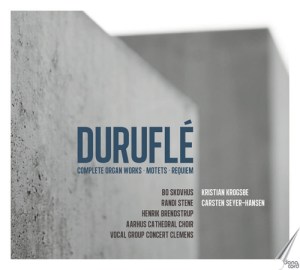 |
 |
|

Support
us financially by purchasing this disc from: |
|
|
|
|
|
|
|
Maurice DURUFLÉ
(1902-1986)
Requiem, op. 9 (1947) [37:45]
Méditation, op. posth.(1964) [4:04]
Quatre Motets sur des thèmes grégoriens, op. 10 (1960)
[7:40]
Prélude et fugue sur le nom d’Alain, op. 7 (1942) [12:31]
Fugue sur le thème du carillon des heures de la cathédrale
de Soissons, op. 12 (c.1967) [3:52]
Prélude, adagio et choral varié sur le thème
du Veni Creator, op. 4 (1930) [20:31]
Prélude sur l’Introït de l’Épiphanie,
op. 13 (1960s) [2:12]
Scherzo, op. 2 (1924) [6:01]
Chant donné - hommage à Jean Gallon [1:59]
Suite, op. 5 (1933) [23:35]
 Bo Skovhus (baritone): Randi Stene (soprano)
Bo Skovhus (baritone): Randi Stene (soprano)
Kristian Krogsøe (organ): Henrik Brendstrup (cello)
Aarhus Cathedral Choir; Vocal Group Concert Clemens/Carsten Seyer-Hansen
rec. May 2010, Aarhus Cathedral (vocal works) and February-April
2012 (organ works)
 DANACORD DACOCD 726 [62:17 + 58:21]
DANACORD DACOCD 726 [62:17 + 58:21]
|
|
|
Duruflé’s Requiem is placed in its
liturgical context in this two disc conspectus, not least because
the composer originally intended it as a suite based on old
Gregorian chants. Its eventual appearance in 1947 was for the
forces we know today, and its dedication was to the composer’s
father who had died two years before. Incidentally the notes
state that it has now been discovered that the Requiem was commissioned
by the Vichy Government as part of a concerted programme to
produce works from composers who had run into financial problems
before and during the War.
The Requiem receives a most interesting and in many ways
compelling reading from the combined Aarhus Cathedral Choir
and Vocal Group Concert Clemens under Carsten Seyer-Hansen.
It’s a mixture of warmth and ice; warmth in the solo contributions
from Bo Skovhus and Randi Stone, and a degree of ice - or at
least spiritual purity - from the combined chorus. Thus the
Introit is restrained and the Kyrie benefits from
the excellent intonation of the chorus. There are sepulchral
organ harmonies (Kristian Krogsøe) in the Domine Jesu
Christe, where Skovhus’s baritone takes on a gravely
noble hue. In the Pie Jesu the contrast between the earlier
restraint and purity is palpable. Soprano Randi Stone certainly
brings some heft to proceedings, in a solo of ardently expressive,
almost operatic proportions. Clearly this is part of a deliberate
scheme because Skovhus’s Libera me marks an even
more decisive shift in favour of the intense, even eruptive.
It is as if the work in this performance accretes increasingly
histrionic qualities as it progresses. Unsympathetic listeners
might well claim that these outbursts are not properly scaled,
whilst those who see in the work more than restraint might reply
that they better represent its more anguished moments.
The Vocal Group Concert Clemens performs the Four Motets
on Gregorian themes, another link to the Requiem. The acoustic
can be rather echo-y here, which perhaps explains why the group
is not quite so well blended as in the combined choral contribution;
the smaller forces seem to have caused the more problems.
The rest of the programme consists of the solo organ works.
There is the Prelude and fugue on the name of Alain,
Op.7, which Duruflé thought his most successful organ
piece. His Op.12, was written in memory of the distinguished
Louis Vierne 25 years after his death, a grand and eloquent
piece. The influence of Tournemire haunts Op.4 and sits proudly
in the august French lineage. The Scherzo Op.2
is a very early work, and takes a shot at diaphanous colour
in best impressionist style. And then, perhaps inevitably, the
recital ends with the Suite Op.5. This ends with the (in)famous
Toccata - and even its composer found it infamous.
But what’s forgotten, sometimes, is the large-scale amplitude
of the opening Prélude and the refined sonorities
of the central Sicilienne.
Duruflé music has been presented in a thoughtful way
here, even though the recording of the Requiem, the central
work, will certainly divide opinion. Fortunately, the two discs
are priced as for one.
Jonathan Woolf
see also reviews by William
Hedley and Hannah
Parry-Ridout
|
Support
us financially by purchasing this disc from:
|
|
|
|
|
|
|
|
|
|
|




 All Nimbus reviews
All Nimbus reviews








